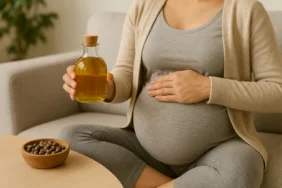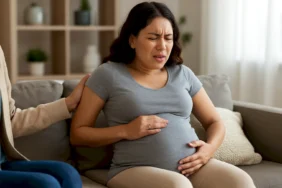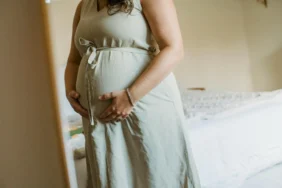Joints hurt post pregnancy is a phrase many new mothers find themselves searching as they navigate the postpartum period. After childbirth, your body goes through significant physical and hormonal changes, and joint pain is a common but often overlooked symptom. Whether it’s your knees, wrists, hips, or ankles, aching joints can make daily tasks more difficult and slow down your recovery. Understanding why joints hurt post pregnancy and what you can do to manage the discomfort is key to regaining strength and well-being. In this article, we’ll explore the main causes, symptoms, and practical relief strategies to help you feel better and move comfortably again.
Joints Hurt Post Pregnancy – What Are the Causes?
Experiencing joint pain after pregnancy is a common issue that many new mothers face, but it can often lead to confusion and concern. The body goes through a plethora of changes during pregnancy, and as it transitions back to its pre-pregnancy state, various factors can contribute to post-pregnancy discomfort. For many women, one of the most searched concerns is why joints hurt post pregnancy. Understanding the potential causes of joint pain can help alleviate some of the worries associated with it.
Common Causes of Joint Pain
- Hormonal fluctuations: Changes in hormone levels can affect ligaments and joints, leading to pain.
- Weight changes: Gaining and then losing weight can place significant stress on the joints.
- Poor posture: Carrying and nursing the baby can lead to poor posture, which may strain joints.
- Activity level: A sudden increase in physical activity, especially post-partum workouts, can trigger joint pain.
- Chronic conditions: Pre-existing conditions may be exacerbated by the physical demands of motherhood.
- Lack of rest: Exhaustion can lead to muscle tension and joint pain as the body struggles to recover.
Many women notice that the joint pain may be more pronounced in areas like the knees, hips, and wrists. This discomfort can sometimes be tied to the body’s response to labor and delivery, which may have caused strain on various joints and ligaments. For those experiencing how joints hurt post pregnancy, this pain is often intensified by the hormonal shifts that occur. Additionally, as the body levels out its hormones post-pregnancy, this adjustment period can come with its own set of challenges.
It’s essential to monitor the pain and its intensity. If the discomfort is consistent or worsening, it may be indicative of a more significant issue. For many women, joints hurt post pregnancy in ways that vary from mild to severe, and recognizing this can help guide treatment. As noted, there are ways to manage this pain through exercises and natural remedies, but understanding the underlying causes can provide valuable insight. Remember that while it is common to experience discomfort, it’s crucial to consult with a healthcare provider if the pain persists or is accompanied by swelling or inflammation.
Common Types of Joint Pain After Pregnancy
After giving birth, many women experience discomfort in their joints, which can stem from various causes. It is essential to understand the specific types of joint pain that may arise during this transition period. For those who find that joints hurt post pregnancy, knowing what to expect can make it easier to manage the pain effectively.
Types of Joint Pain
- Knee Pain: Often due to the added weight and pressure during pregnancy.
- Wrist Pain: Commonly caused by repetitive motions associated with caring for a newborn.
- Lower Back Pain: Resulting from changes in posture and the physical toll of pregnancy.
- Hip Pain: Due to hormonal changes that affect ligament flexibility.
- Ankle Pain: Related to swelling and stress from carrying extra weight.
- Finger Pain: Often linked to conditions like De Quervain’s tenosynovitis.
- Shoulder Pain: Can be attributed to lifting and holding the baby frequently.
Understanding the different types of joint pain can be beneficial for new mothers as they navigate their postpartum recovery. While some pain may diminish naturally over time, it is crucial to monitor symptoms for changes. If pain persists or worsens, it might indicate an underlying issue requiring professional evaluation.
In summary, being aware of the types of joint pain after pregnancy will help you identify normal discomfort versus signs that warrant medical attention.
By recognizing these common types of joint pain and their potential causes, new mothers can take proactive steps toward alleviating their discomfort. In the following sections, we will explore how hormonal changes contribute to post-pregnancy joint pain and provide effective exercises and natural remedies for relief.

How Hormonal Changes Contribute to Post-Pregnancy Joint Pain
Post-pregnancy joint pain, often experienced during the recovery phase, can be significantly influenced by hormonal changes that occur in the body. After childbirth, there is a notable decrease in hormones such as estrogen and relaxin. These hormones originally helped to relax ligaments during pregnancy but can lead to increased joint laxity and instability after delivery. For many women, this is when joints hurt post pregnancy, as their bodies adjust to these hormonal shifts. As a result, many women report discomfort and pain throughout their joints as their bodies adjust to these hormonal shifts. Hip Pain After Pregnancy can often be one of the most pronounced issues, as the body seeks to stabilize following childbirth.
The hormonal fluctuations can also make the body more susceptible to inflammation, which can further exacerbate joint pain. For many women, this is when joints hurt post pregnancy, as the reduction in estrogen may heighten sensitivity to pain and discomfort. This situation is compounded by the physical demands of caring for a newborn. The combination of hormonal changes and physical strain can make even routine activities challenging, leading to heightened reports of joint pain after pregnancy.
Hormonal Changes and Their Effects
- Decrease in Estrogen: Reduces joint lubrication and stability.
- Reduction in Relaxin: May lead to increased joint stiffness.
- Increased Inflammation: Heightens pain sensitivity in the joints.
- Muscle Weakness: Postpartum recovery can weaken core and joint-supporting muscles.
- Weight Fluctuations: Can add extra strain on joints, especially in the hips and knees.
- Fatigue and Stress: May cause tension in muscles around joints, worsening pain.
Additionally, the physical exertion related to baby care and adjustments to new routines can worsen joint discomfort. Many women may find themselves shifting their body mechanics due to fatigue or discomfort, further aggravating the situation. For those experiencing how joints hurt post pregnancy, these shifts can make the pain feel more intense. It’s important to note that while experiencing joint pain post-pregnancy can be normal, the severity and duration of the pain should be monitored. Developing a deeper understanding of how hormonal changes impact joint health can help new mothers manage their symptoms more effectively.
In conclusion, hormonal changes play a crucial role in the experience of joint pain during the postpartum phase. While some level of discomfort can be expected, new mothers should be proactive in addressing this pain through gentle exercises and lifestyle adjustments. It’s essential to recognize that persistent or severe joint pain may warrant further medical evaluation, especially if it interferes with daily activities. Early intervention can facilitate a smoother recovery process and lead to improved overall well-being.
Effective Exercises to Relieve Post-Pregnancy Joint Pain
Post-pregnancy joint pain can be a common concern for many new mothers as their bodies undergo significant changes during and after pregnancy. For those experiencing how joints hurt post pregnancy, these changes can lead to discomfort and pain in areas such as the knees, hips, and wrists. Fortunately, engaging in effective exercises can help alleviate some of these issues by strengthening muscles, improving flexibility, and promoting overall well-being.
When incorporating exercises into your routine, it’s crucial to start slowly, especially if you are recovering from childbirth. Focus on low-impact movements that minimize stress on your joints while still providing benefits. It’s also wise to consult with a healthcare provider before starting any new exercise regimen, particularly if you have a history of joint pain or other medical conditions.
Recommended Exercises
- Gentle Stretching: Begin with basic stretches to improve flexibility in your muscles and joints.
- Walking: A simple yet effective form of exercise that helps increase circulation without putting too much strain on your body.
- Pelvic Tilts: These exercises strengthen abdominal muscles and help alleviate lower back pain.
- Wall Sits: Strengthening the legs and supporting the knees can offer significant relief for joint discomfort.
- Modified Yoga: Incorporating gentle yoga can enhance overall mobility and relaxation while providing alignment and strength.
- Swimming: This is an excellent low-impact activity that allows you to move your body freely while reducing joint stress.
- Strength Training: Gradually introducing light weights can help to build muscle strength, which in turn supports your joints.
By practicing these exercises regularly, new moms can potentially reduce their joint pain stemming from pregnancy. Not only do these activities improve physical health, but they also offer an opportunity for some much-needed personal time to recharge. Remember, it’s essential to listen to your body and adjust the intensity of your workouts accordingly to avoid exacerbating any existing pain.
Incorporating exercise into your postpartum routine is not just beneficial for your joints; it encourages mental well-being, which is equally important during this transitional phase.
Ultimately, understanding how to manage your joint pain after pregnancy is essential for a healthy recovery and return to your daily activities. As you navigate postpartum recovery, integrating these exercises can play a key role in enhancing your overall comfort and mobility. If joint pain persists and becomes concerning, seeking professional advice can help address any underlying issues that may warrant further attention.

Natural Remedies for Joint Pain After Pregnancy
Experiencing joint pain after pregnancy is a common issue that many new mothers face. This discomfort can stem from various factors, including hormonal changes, weight fluctuations, and the physical demands of caring for a newborn. Fortunately, there are several natural remedies available that can alleviate this pain and promote healing. Prioritizing self-care during this transitional period is essential for both physical and emotional well-being.
Natural Remedies to Consider
- Gentle Exercise: Engage in low-impact activities like walking or yoga to maintain mobility without stressing the joints.
- Hot and Cold Therapy: Alternate between warm compresses and cold packs to reduce inflammation and soothe sore muscles.
- Herbal Supplements: Consider natural anti-inflammatory herbs such as turmeric or ginger, which may provide relief from pain.
- Hydration: Drinking plenty of water keeps joints lubricated and can help minimize discomfort.
- Rest and Elevation: Elevate your legs and take breaks as needed to avoid excessive strain on the joints.
- Nutrition: Incorporate a balanced diet rich in omega-3 fatty acids to support joint health and reduce inflammation.
- Massage Therapy: Regular massages can help relax tense muscles and improve blood circulation around the affected joints.
Exploring these natural remedies can facilitate recovery and improve your overall quality of life. For those who experience how joints hurt post pregnancy, these remedies can provide significant relief. It’s critical to listen to your body and respond accordingly as you navigate the challenges of postpartum recovery. If joint pain persists or worsens, it may indicate a need for further evaluation or intervention. Taking proactive steps, such as maintaining a healthy lifestyle and utilizing these remedies, can help ease discomfort and enhance your postpartum experience.
When to Seek Medical Help for Joint Pain After Pregnancy
Experiencing joint pain post pregnancy is common, and while many mothers may find it a normal part of their postpartum journey, it’s essential to be aware of when to seek medical help. Joint pain may arise from various factors, including hormonal changes and physical strain associated with caring for a newborn. However, persistent or severe pain can indicate underlying issues that may require professional evaluation.
Signs You Should See a Doctor
- Joint pain lasting more than a few weeks
- Severe swelling or redness around the joints
- Joint pain accompanied by fever or other flu-like symptoms
- Inability to move the joint or joint stiffness
- Worsening pain despite home care or rest
- Any joint pain not improving with typical postpartum exercises
Listening to your body is crucial, especially during the postpartum phase. If you experience any of the symptoms listed above, it may indicate a more serious condition that warrants a visit to your healthcare provider. Early intervention can lead to more effective treatment and improved quality of life.
While some level of discomfort is normal during the recovery process, vigilance is key. Always prioritize your health and well-being, as untreated issues can lead to chronic pain or other complications. If you’re uncertain about your symptoms or how to manage your pain effectively, consulting a specialist in musculoskeletal rehabilitation can be beneficial.
How to Prevent Joint Pain During the Postpartum Period
To effectively manage joint pain during the postpartum period, it’s crucial to implement preventive measures that support overall joint health. After childbirth, many women experience joint discomfort due to hormonal changes, physical strain from caring for a newborn, and changes in body mechanics. Taking proactive steps can significantly reduce the risk of exacerbating joint pain, allowing for a smoother recovery.
Preventive Measures for Joint Pain
- Focus on Posture: Maintaining proper posture while breastfeeding or holding your baby can help alleviate undue stress on joints.
- Gentle Stretching: Incorporate gentle stretching into your daily routine to improve flexibility and circulation.
- Stay Hydrated: Drinking adequate water helps maintain joint lubrication and overall body function.
- Gradual Exercise: Start with light exercises that strengthen the muscles around your joints without adding strain.
- Weight Management: Keeping a healthy weight can reduce pressure on the joints, especially in the knees and hips.
- Rest and Recovery: Ensure to get enough rest and listen to your body, allowing it time to heal.
- Nutrition: Eating a well-balanced diet rich in anti-inflammatory foods can support joint health and reduce pain.
Employing these preventive measures can significantly aid in minimizing the discomfort associated with joint pain during the postpartum period. Additionally, it is essential to pay attention to your body’s signals and adapt your activities accordingly. Implement techniques that promote relaxation and support your physical health, as they can contribute to a faster recovery.
Ultimately, understanding your body’s changes in the postpartum phase is vital for effective joint pain management. While joint pain can be a common experience after childbirth, for many women, the feeling of how joints hurt post pregnancy can be alleviated with the right approach. There are ways to mitigate it. By taking conscious steps to protect your joints, you can enjoy your new role as a parent without being hindered by physical discomfort. Remember that if your pain persists or worsens, consulting a healthcare professional is advised to explore further treatment options.




